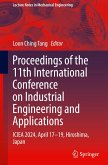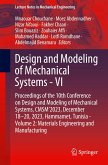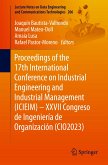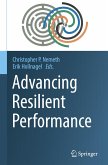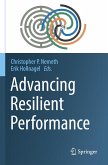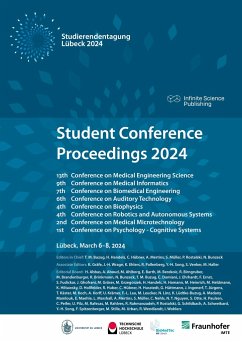The Proceedings of the 2024 Conference on Systems Engineering Research
Herausgegeben:Salado, Alejandro; Valerdi, Ricardo; Steiner, Rick; Head, Larry
The Proceedings of the 2024 Conference on Systems Engineering Research
Herausgegeben:Salado, Alejandro; Valerdi, Ricardo; Steiner, Rick; Head, Larry
- Gebundenes Buch
- Merkliste
- Auf die Merkliste
- Bewerten Bewerten
- Teilen
- Produkt teilen
- Produkterinnerung
- Produkterinnerung
The 22nd International Conference on Systems Engineering Research (CSER 2024) pushes the boundaries of systems engineering research and responds to new challenges for systems engineering.
CSER was founded in 2003 by Stevens Institute of Technology and the University of Southern California. In 2024 the conference was hosted by the University of Arizona, home to the first-ever established Department of Systems Engineering.
The following foundational research topics are included:
- Scientific Foundations of Systems Engineering - Digital Engineering, Digital Twins - Digital Transformation…mehr
Andere Kunden interessierten sich auch für
![Proceedings of the 11th International Conference on Industrial Engineering and Applications Proceedings of the 11th International Conference on Industrial Engineering and Applications]() Proceedings of the 11th International Conference on Industrial Engineering and Applications164,99 €
Proceedings of the 11th International Conference on Industrial Engineering and Applications164,99 €![Design and Modeling of Mechanical Systems - VI Design and Modeling of Mechanical Systems - VI]() Design and Modeling of Mechanical Systems - VI149,99 €
Design and Modeling of Mechanical Systems - VI149,99 €![Proceedings of the 17th International Conference on Industrial Engineering and Industrial Management (ICIEIM) - XXVII Congreso de Ingeniería de Organización (CIO2023) Proceedings of the 17th International Conference on Industrial Engineering and Industrial Management (ICIEIM) - XXVII Congreso de Ingeniería de Organización (CIO2023)]() Proceedings of the 17th International Conference on Industrial Engineering and Industrial Management (ICIEIM) - XXVII Congreso de Ingeniería de Organización (CIO2023)186,99 €
Proceedings of the 17th International Conference on Industrial Engineering and Industrial Management (ICIEIM) - XXVII Congreso de Ingeniería de Organización (CIO2023)186,99 €![Advancing Resilient Performance Advancing Resilient Performance]() Advancing Resilient Performance90,99 €
Advancing Resilient Performance90,99 €![Advancing Resilient Performance Advancing Resilient Performance]() Advancing Resilient Performance90,99 €
Advancing Resilient Performance90,99 €![Student Conference Proceedings 2024 Student Conference Proceedings 2024]() Student Conference Proceedings 202499,90 €
Student Conference Proceedings 202499,90 €![International Mining Geology Conference 2024 Proceedings International Mining Geology Conference 2024 Proceedings]() International Mining Geology Conference 2024 Proceedings83,99 €
International Mining Geology Conference 2024 Proceedings83,99 €-
-
-
The 22nd International Conference on Systems Engineering Research (CSER 2024) pushes the boundaries of systems engineering research and responds to new challenges for systems engineering.
CSER was founded in 2003 by Stevens Institute of Technology and the University of Southern California. In 2024 the conference was hosted by the University of Arizona, home to the first-ever established Department of Systems Engineering.
The following foundational research topics are included:
- Scientific Foundations of Systems Engineering
- Digital Engineering, Digital Twins
- Digital Transformation
- Advances in Model-Based Systems Engineering (MBSE)
- Value-based and Agile Systems Engineering
- Artificial Intelligence for Systems and Software Engineering (AI4SE)
- Systems and Software Engineering for Artificial Intelligence (SE4AI)
- Cybersecurity and System Security Engineering
- Uncertainty and Complexity Management
- Trust and Autonomous Systems
- Human-Systems Integration
- Systems of Systems
- Social Systems Engineering
- Systems Thinking
- Advances in requirements engineering, systems architecture, systems integration, and verification and validation.
The 21st Annual Conference on Systems Engineering Research (CSER 2024) was poised to push the boundaries of systems engineering, embracing a wide array of themes from its scientific underpinnings to the forefront of digital engineering transformation and the seamless integration of artificial intelligence within systems and software engineering. Delving into cutting-edge topics such as Model-Based Systems Engineering (MBSE), cybersecurity, and the management of uncertainty and complexity, CSER 2024 tackled the varied challenges and seize the opportunities emerging in the field. The conference's commitment to blending theoretical insights with practical innovations makes it a pivotal event for the systems engineering community.
Hinweis: Dieser Artikel kann nur an eine deutsche Lieferadresse ausgeliefert werden.
CSER was founded in 2003 by Stevens Institute of Technology and the University of Southern California. In 2024 the conference was hosted by the University of Arizona, home to the first-ever established Department of Systems Engineering.
The following foundational research topics are included:
- Scientific Foundations of Systems Engineering
- Digital Engineering, Digital Twins
- Digital Transformation
- Advances in Model-Based Systems Engineering (MBSE)
- Value-based and Agile Systems Engineering
- Artificial Intelligence for Systems and Software Engineering (AI4SE)
- Systems and Software Engineering for Artificial Intelligence (SE4AI)
- Cybersecurity and System Security Engineering
- Uncertainty and Complexity Management
- Trust and Autonomous Systems
- Human-Systems Integration
- Systems of Systems
- Social Systems Engineering
- Systems Thinking
- Advances in requirements engineering, systems architecture, systems integration, and verification and validation.
The 21st Annual Conference on Systems Engineering Research (CSER 2024) was poised to push the boundaries of systems engineering, embracing a wide array of themes from its scientific underpinnings to the forefront of digital engineering transformation and the seamless integration of artificial intelligence within systems and software engineering. Delving into cutting-edge topics such as Model-Based Systems Engineering (MBSE), cybersecurity, and the management of uncertainty and complexity, CSER 2024 tackled the varied challenges and seize the opportunities emerging in the field. The conference's commitment to blending theoretical insights with practical innovations makes it a pivotal event for the systems engineering community.
Hinweis: Dieser Artikel kann nur an eine deutsche Lieferadresse ausgeliefert werden.
Produktdetails
- Produktdetails
- Conference on Systems Engineering Research Series
- Verlag: Springer / Springer Nature Switzerland / Springer, Berlin
- Artikelnr. des Verlages: 978-3-031-62553-4
- 2024
- Seitenzahl: 640
- Erscheinungstermin: 26. Juli 2024
- Englisch
- Abmessung: 241mm x 160mm x 31mm
- Gewicht: 1230g
- ISBN-13: 9783031625534
- ISBN-10: 3031625536
- Artikelnr.: 70561128
- Herstellerkennzeichnung Die Herstellerinformationen sind derzeit nicht verfügbar.
- Conference on Systems Engineering Research Series
- Verlag: Springer / Springer Nature Switzerland / Springer, Berlin
- Artikelnr. des Verlages: 978-3-031-62553-4
- 2024
- Seitenzahl: 640
- Erscheinungstermin: 26. Juli 2024
- Englisch
- Abmessung: 241mm x 160mm x 31mm
- Gewicht: 1230g
- ISBN-13: 9783031625534
- ISBN-10: 3031625536
- Artikelnr.: 70561128
- Herstellerkennzeichnung Die Herstellerinformationen sind derzeit nicht verfügbar.
Alejandro Salado is an Associate Professor of systems engineering with the Department of Systems and Industrial Engineering at the University of Arizona and the Director of its Systems Engineering program. In addition, he provides part-time consulting in areas related to enterprise transformation, cultural change of technical teams, systems engineering, and engineering strategy. Alejandro conducts research in problem formulation, design of verification and validation strategies, model-based systems engineering, and engineering education. Before joining academia, he held positions as systems engineer, chief architect, and chief systems engineer in manned and unmanned space systems of up to $1B in development cost. He has published over 150 technical papers, and his research has received federal funding from the National Science Foundation (NSF), the Naval Surface Warfare Command (NSWC), the Naval Air System Command (NAVAIR), and the Office of Naval Research (ONR), among others. He is a recipient of the NSF CAREER Award, the International Fulbright Science and Technology Award, and several best paper awards. Dr. Salado holds a BS/MS in electrical and computer engineering from the Polytechnic University of Valencia, a MS in project management and a MS in electronics engineering from the Polytechnic University of Catalonia, the SpaceTech MEng in space systems engineering from the Technical University of Delft, and a PhD in systems engineering from the Stevens Institute of Technology. He is an Associate Fellow of the American Institute of Aeronautics and Astronautics (AIAA). Ricardo Valerdi is a Professor and Head of the Department of Systems & Industrial Engineering at the University of Arizona. Previously he was a Research Associate in the Engineering Systems Division at the Massachusetts Institute of Technology. His research focuses on systems engineering metrics, cost estimation, test & evaluation, enterprise transformation, and performance measurement. His research has been funded by Army, Navy, Air Force, BAE Systems, Lockheed Martin, Raytheon, the IBM Center for the Business of Government, the Arizona Diamondbacks, and the National Collegiate Athletic Association. He was the Founder and co-Editor-in-Chief of the Journal of Enterprise Transformation and Editor-in-Chief of the Journal of Cost Analysis and Parametrics. He served on the Board of Directors and is a Fellow of the International Council on Systems Engineering (INCOSE) as well as a member of the National Academy of Engineering of Mexico. He received a Ph.D. in Industrial & Systems Engineering from the University of Southern California. Rick Steiner is an independent Model Based Systems Engineering (MBSE) consultant and systems modeling coach, with clients in various Aerospace and Defense companies, and an adjunct professor at the University of Arizona. He retired after a 30-year career at Raytheon as an Engineering Fellow and a Raytheon Certified Architect. He has focused on pragmatic application of systems engineering modeling techniques and has been an advocate, consultant, and instructor of model-based engineering. Rick has served as chief engineer, architect, and lead system modeler for several large-scale defense programs. He has been recognized by the International Council on Systems Engineering (INCOSE) as an Expert Systems Engineering Professional (ESEP) and has been honored as an INCOSE Fellow. Mr. Steiner continues to be a key contributor to the development of SysMLv2 and contributes to the system modeling professional certification process. He is also co-author of "A Practical Guide to SysML", currently in its 3rd edition. Rick is an avid amateur astronomer, auto restorer, bass guitarist, Church volunteer, and recumbent bicyclist. Larry Head received his Ph.D. degree in Systems Engineering from the University of Arizona in 1989. He has over 30 years of research and development experience in adaptive traffic signal control, signal priority, traffic management, and connected and autonomous vehicle systems. From January 2020-July 2020 Dr. Head served as the Interim Vice Provost for Online Learning at the University of Arizona. From March 2018 to July 2019 Dr. Head served as the Interim Dean of the College of Engineering at the University of Arizona. From 2016 - 2018 Dr. Head served as the founding Director of the Transportation Research Institute. From 2006-2013 Dr. Head served as the Department Head of the Systems and Industrial Engineering Department at the University of Arizona. From 1997 to 2003 he was the Senior Vice President for Research and Development for Siemens ITS where they developed and deployed advanced traffic management systems in over 40 cities in the US. In 2007, Dr. Head partnered with Raytheon, iRobot, Tucson Embedded Systems (TES), and Preferred Chassis to compete in the DARPA Grand (Urban) Challenge. In 2010, in cooperation with Maricopa County Department of Transportation (MCDOT), they established the MCDOT SMARTDrive National Connected Vehicle Test bed in Anthem, Az. The test bed has been a cornerstone for research in Connected Vehicle systems including the Multi Modal Intelligent Traffic Signal System (MMITSS). Dr. Head served as chair of the National Academies Transportation Research Board's Traffic Signal Systems Committee (AHB25) from 2006-2012 and is currently a member of the TRB Intelligent Transportation Systems Committee and Traffic Signal Systems Committee. He was co-Chair of the National Transportation Communication for ITS Protocol (NTCIP) Signal Control and Prioritization Working Group (1211) from 2014-present and a member of the Society of Automotive Engineers (SAE) Dedicated Short Range Communication Technical Committee from 2014 - 2018, and now a member of the SAE C-V2X Technical Committee.
Part I. MBSE/DE.- Chapter 1. Towards deriving a digital ontology for systems engineering and acquisition groups.- Chapter 2. Digital requirements engineering with an INCOSE-derived SysML meta-model.- Chapter 3. Towards Formalizing a Systems of Systems Core Ontology for Capability Configuration, a SysML Approach.- Chapter 4. SysML v2 for automated Co-Simulation from Systems Architecture Models.- Part II. Problem domain.- Chapter 5. Exploring Dynamic Preferences in Systems Engineering.- Chapter 6. Developing a KPI-driven framework to systematically align companies with the EU Taxonomy.- Chapter 7. Enhancing Industrial Energy Management: Improving Efficiency and Stakeholder Satisfaction.- Part III. V&V.- Chapter 8. Graph Complexity Measures as Indicators of Verification Complexity.- Chapter 9. An Ontological Foundation for the Verification and Validation of Complex Systems in the Age of Artificial Intelligence.- Chapter 10. Developing a Theoretical Basis for Validation in Systems Engineering.- Chapter 11. Towards a Rigorous Metric for Measuring Inconsistencies in Stakeholder Preferences in Systems Engineering.- Part IV. Autonomy and networks.- Chapter 12. Self-Organizing Evolutionary Complexity: Implications for Systems Engineering.- Chapter 13. Simulating the Emergent Social Networks of Army Units.- Chapter 14. Predictive and Prescriptive Analyses of Autonomy Integration into the System of Systems.- Chapter 15. A New Multi-Agent System Consensus Algorithm Inspired by Synchronous Turtle Hatching Behavior.- Part V. Education.- Chapter 16. Lessons Learned from Teaching Systems Practices in an Art Studio Format.- Chapter 17. Developing an Academic Case Study to Advance Digital Engineering.- Chapter 18. A Digital Engineering Factory for Students.- Chapter 19. Is your Systems Engineering Knowledge and Practice Ready for the New Types of Systems Emerging Today?.- Part VI. SoS.- Chapter 20. System of Systems (SoS) Approach for Improving Quality of Kidney Transplant Decision-Making Support for Transplant Surgeons.- Chapter 21. Social Systems of Systems Thinking to Improve Decision-Making Processes Towards the Sustainable Transition.- Chapter 22. Sustainable Systems: Measuring Carbon Emissions of Navy Ships.- Part VII. AI4SE.- Chapter 23. Can Large Language Models Accelerate Digital Transformation by Generating Expert-Like Systems Engineering Artifacts? Insights from an Empirical Exploration.- Chapter 24. How Digital Twins could support systems engineering processes? Insights from literature review.- Chapter 25. AI-enabled policy content modeling - a systems approach.- Chapter 26. Identification of Variables Impacting Cascading Failures in Aerospace Systems: A Natural Language Processing Approach.- Chapter 27. Integrating Edge Computing and Machine Learning for Thermal Anomaly Detection: A Space Systems Engineering Architecture.- Part VIII. Architecture & Biomimicry.- Chapter 28. Dynamic Reconfiguration of Software Systems Using Smart Contracts.- Chapter 29. On Families of Systems Architecture.- Chapter 30. A New Biological Inspired Resource Allocation Algorithm for Distributed Multi Agent Systems with Limited Knowledge.- Chapter 31. From Plant-Pollinator to Product-Customer: Bio-Inspired Network Modularity Analysis in Design for Market Systems.- Chapter 32. Satellite Network Architecture Performance: Setting the Stage for Bio-Inspired Network Design.- Part IX. AI in SE.- Chapter 33. Enabling Understanding of AI Model Behavior Through Visualization.- Chapter 34. Addressing Safety in AI-Based Systems: Insights from Systems Engineering.- Chapter 35. Towards Transparent Operations and Sustainment: A Conceptual Framework for Causal Interpretable Machine Learning Models for System Health Prognostics and Maintenance.- Part X. Applications.- Chapter 36. Analyzing Heat Related Injuries at Fort Moore.- Chapter 37. Toward Improving User Experience and the Adoption of mHealth Apps for Mental Health: An Exploratory Study.- Chapter 38. Factory in Space - Considerations and Feasibility for Low Earth Orbit.- Chapter 39. Safeguarding end-to-end service continuity when connecting safety-critical systems to the cloud.
Part I. MBSE/DE.- Chapter 1. Towards deriving a digital ontology for systems engineering and acquisition groups.- Chapter 2. Digital requirements engineering with an INCOSE-derived SysML meta-model.- Chapter 3. Towards Formalizing a Systems of Systems Core Ontology for Capability Configuration, a SysML Approach.- Chapter 4. SysML v2 for automated Co-Simulation from Systems Architecture Models.- Part II. Problem domain.- Chapter 5. Exploring Dynamic Preferences in Systems Engineering.- Chapter 6. Developing a KPI-driven framework to systematically align companies with the EU Taxonomy.- Chapter 7. Enhancing Industrial Energy Management: Improving Efficiency and Stakeholder Satisfaction.- Part III. V&V.- Chapter 8. Graph Complexity Measures as Indicators of Verification Complexity.- Chapter 9. An Ontological Foundation for the Verification and Validation of Complex Systems in the Age of Artificial Intelligence.- Chapter 10. Developing a Theoretical Basis for Validation in Systems Engineering.- Chapter 11. Towards a Rigorous Metric for Measuring Inconsistencies in Stakeholder Preferences in Systems Engineering.- Part IV. Autonomy and networks.- Chapter 12. Self-Organizing Evolutionary Complexity: Implications for Systems Engineering.- Chapter 13. Simulating the Emergent Social Networks of Army Units.- Chapter 14. Predictive and Prescriptive Analyses of Autonomy Integration into the System of Systems.- Chapter 15. A New Multi-Agent System Consensus Algorithm Inspired by Synchronous Turtle Hatching Behavior.- Part V. Education.- Chapter 16. Lessons Learned from Teaching Systems Practices in an Art Studio Format.- Chapter 17. Developing an Academic Case Study to Advance Digital Engineering.- Chapter 18. A Digital Engineering Factory for Students.- Chapter 19. Is your Systems Engineering Knowledge and Practice Ready for the New Types of Systems Emerging Today?.- Part VI. SoS.- Chapter 20. System of Systems (SoS) Approach for Improving Quality of Kidney Transplant Decision-Making Support for Transplant Surgeons.- Chapter 21. Social Systems of Systems Thinking to Improve Decision-Making Processes Towards the Sustainable Transition.- Chapter 22. Sustainable Systems: Measuring Carbon Emissions of Navy Ships.- Part VII. AI4SE.- Chapter 23. Can Large Language Models Accelerate Digital Transformation by Generating Expert-Like Systems Engineering Artifacts? Insights from an Empirical Exploration.- Chapter 24. How Digital Twins could support systems engineering processes? Insights from literature review.- Chapter 25. AI-enabled policy content modeling - a systems approach.- Chapter 26. Identification of Variables Impacting Cascading Failures in Aerospace Systems: A Natural Language Processing Approach.- Chapter 27. Integrating Edge Computing and Machine Learning for Thermal Anomaly Detection: A Space Systems Engineering Architecture.- Part VIII. Architecture & Biomimicry.- Chapter 28. Dynamic Reconfiguration of Software Systems Using Smart Contracts.- Chapter 29. On Families of Systems Architecture.- Chapter 30. A New Biological Inspired Resource Allocation Algorithm for Distributed Multi Agent Systems with Limited Knowledge.- Chapter 31. From Plant-Pollinator to Product-Customer: Bio-Inspired Network Modularity Analysis in Design for Market Systems.- Chapter 32. Satellite Network Architecture Performance: Setting the Stage for Bio-Inspired Network Design.- Part IX. AI in SE.- Chapter 33. Enabling Understanding of AI Model Behavior Through Visualization.- Chapter 34. Addressing Safety in AI-Based Systems: Insights from Systems Engineering.- Chapter 35. Towards Transparent Operations and Sustainment: A Conceptual Framework for Causal Interpretable Machine Learning Models for System Health Prognostics and Maintenance.- Part X. Applications.- Chapter 36. Analyzing Heat Related Injuries at Fort Moore.- Chapter 37. Toward Improving User Experience and the Adoption of mHealth Apps for Mental Health: An Exploratory Study.- Chapter 38. Factory in Space - Considerations and Feasibility for Low Earth Orbit.- Chapter 39. Safeguarding end-to-end service continuity when connecting safety-critical systems to the cloud.


